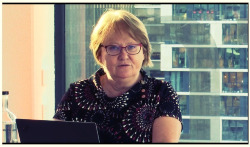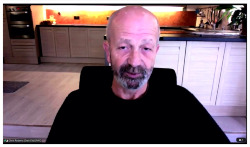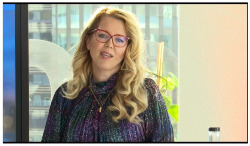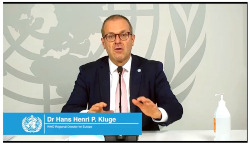|
Luxembourg, 30 November 2021 – The 31st Alzheimer Europe Conference (#31AEC) “Resilience in dementia: Moving beyond the COVID-19 pandemic” was formally opened on the afternoon of 29 November 2021. Over 600 participants from 38 countries are attending the event, which is Alzheimer Europe’s second virtual conference and is taking place from 29 November to 1 December 2021. On the agenda are almost 300 presenters (160 oral presentations, 137 quick oral presentations and 35 poster presentations), sharing their research, projects and experiences in an atmosphere of collaboration and solidarity.
 Conference co-hosts Kim Coppes from Live Online Events and Jean Georges, Executive Director of Alzheimer Europe (pictured, top) welcomed the delegates from our conference studio in Utrecht, Netherlands and gave the floor to Iva Holmerová, Chairperson of Alzheimer Europe (pictured, left), to officially open the conference. She extended a special welcome to the 37 people with dementia who are among the delegates, as well as their supporters. Conference co-hosts Kim Coppes from Live Online Events and Jean Georges, Executive Director of Alzheimer Europe (pictured, top) welcomed the delegates from our conference studio in Utrecht, Netherlands and gave the floor to Iva Holmerová, Chairperson of Alzheimer Europe (pictured, left), to officially open the conference. She extended a special welcome to the 37 people with dementia who are among the delegates, as well as their supporters.
As we learned from last year’s event, our virtual conferences can be highly engaging and interactive, she noted, inviting delegates to make the most of the opportunities provided to ask questions to the presenters, give their comments and thoughts and to participate in the many polls and questions Alzheimer Europe will be organising during the three-day event.
When setting the theme for this year’s conference “Resilience in dementia: Moving beyond the COVID-19 pandemic”, Alzheimer Europe wanted to focus on how people with dementia, their carers, health and social care professionals, Alzheimer’s associations and the research community had adapted to the pandemic. “As Chairperson of Alzheimer Europe, I have truly been in awe at how the European dementia community has risen to the challenge of the pandemic and identified new and innovative ways to support, care and conduct research”, she stressed.
In closing, she thanked the presenters and delegates for joining, the organising and programme committees and all conference sponsors, for making the event possible. In particular, she expressed her gratitude to the health programme of the European Union and the corporate sponsors of the conference: AbbVie, ADDI the Alzheimer’s Disease Data Initiative, Biogen, Roche and TauRx Therapeutics. She also singled out the fantastic collaboration that Alzheimer Europe has developed with the INTERDEM network, which held its Annual Meeting just prior to our Virtual Conference and which is, as every year, strongly represented at this event.
Following these opening words, delegates were also welcomed by Chris Roberts, Chairperson of the European Working Group of People with Dementia (EWGPWD) (pictured, right) and Marjolein de Vugt, Chairperson-elect of the INTERDEM network, followed by a video message from Hans Kluge, WHO Regional Director for Europe.
Chris Roberts addressed delegates from his perspective as a person living with dementia and as the Chairperson of the EWGPWD. He welcomed everyone to the conference and reflected on the importance of the EWGPWD and on how the group brings together people from different countries, giving an international voice for those living with dementia. “Nothing About Us Without All of Us”, he reminded delegates, insisting that we all need to work together to promote a better quality of life for those affected by dementia and to help reduce the population’s risk of getting dementia. “We are doing our best to live with dementia, not dying from it”, he said and stressed that with support and understanding, people living with dementia can all live better lives.
 Marjolein de Vugt (pictured, left) spoke on behalf of INTERDEM (Early detection and timely INTERvention in DEMentia). She highlighted that current circumstances challenge us; our resilience; our creativity and more than ever require our commitment to care. Marjolein de Vugt (pictured, left) spoke on behalf of INTERDEM (Early detection and timely INTERvention in DEMentia). She highlighted that current circumstances challenge us; our resilience; our creativity and more than ever require our commitment to care.
“Alzheimer Europe strengthens the voices of people with dementia not only to influence practice and policy but also to influence research. INTERDEM has reaped the benefits of this, for example by working closely with the European working group of people with dementia in several research projects”, she stated. "Young researchers are our future and the INTERDEM Academy fosters their talent and supports them in their pathway to senior positions in the field. The combined INTERDEM meeting and Alzheimer Europe Conference are a fantastic opportunity for them to present their work and to build their networks."
 In a pre-recorded video message to conference delegates, the WHO Regional Director for Europe Hans Kluge (pictured, right) highlighted that dementia was the “leading cause of dependency and disability among older people in the WHO European region” and that WHO/Europe was therefore happy to have worked closely with Alzheimer Europe and other European partners on the implementation of the Global Action Plan on the public health response to dementia (2017-2025). He added that “crises bring about change and COVID-19 is no exception, systemic flaws in our health systems have been exposed”. For European countries, COVID-19 has been a “seismic shift in terms of healthcare” and for that reason, he called on delegates to identify good practices and learnings to improve the situation of people with dementia and their carers in Europe. In a pre-recorded video message to conference delegates, the WHO Regional Director for Europe Hans Kluge (pictured, right) highlighted that dementia was the “leading cause of dependency and disability among older people in the WHO European region” and that WHO/Europe was therefore happy to have worked closely with Alzheimer Europe and other European partners on the implementation of the Global Action Plan on the public health response to dementia (2017-2025). He added that “crises bring about change and COVID-19 is no exception, systemic flaws in our health systems have been exposed”. For European countries, COVID-19 has been a “seismic shift in terms of healthcare” and for that reason, he called on delegates to identify good practices and learnings to improve the situation of people with dementia and their carers in Europe.
Resilience in dementia – adapting to the COVID-19 pandemic as a dementia advocate
 The opening ceremony was followed by a short plenary session in which the first of two keynote presentations was delivered (the other to take place on the last day of the conference). In his keynote presentation, which focused on resilience and adapting to the COVID-19 pandemic as a dementia advocate, Kevin Quaid, Vice-chairperson of the EWGPWD (pictured, left) addressed the people with dementia in the audience. He emphasised the importance of making sure to have a specific diagnosis. “To be told that you ‘have dementia’ or have ‘a touch of dementia’ is not a proper diagnosis” he said. He also stressed the need to make sure that whatever medication a person is on, it is suitable for their particular type of dementia. “A wrong diagnosis can lead to wrong medication”, he pointed out. Overall, his message to people with dementia everywhere was to “Try and keep a positive mental attitude and try and keep your brain active. That is exactly why I am doing as well as I am after eight years with Lewy Body Dementia.” The opening ceremony was followed by a short plenary session in which the first of two keynote presentations was delivered (the other to take place on the last day of the conference). In his keynote presentation, which focused on resilience and adapting to the COVID-19 pandemic as a dementia advocate, Kevin Quaid, Vice-chairperson of the EWGPWD (pictured, left) addressed the people with dementia in the audience. He emphasised the importance of making sure to have a specific diagnosis. “To be told that you ‘have dementia’ or have ‘a touch of dementia’ is not a proper diagnosis” he said. He also stressed the need to make sure that whatever medication a person is on, it is suitable for their particular type of dementia. “A wrong diagnosis can lead to wrong medication”, he pointed out. Overall, his message to people with dementia everywhere was to “Try and keep a positive mental attitude and try and keep your brain active. That is exactly why I am doing as well as I am after eight years with Lewy Body Dementia.”
Poster presentations, Quick Oral Presentations and Parallel sessions
Following the opening ceremony and the keynote lecture, delegates had the chance to join one of four parallel sessions. There was one on the topic of adapting day and community care and one on arts and culture. The NEURONET initiative (Efficiently Networking European Neurodegeneration Research) organised the third session, and the fourth parallel session was organised by INTERDEM entitled “Leaving University after PhD? Opportunities and experiences across sectors”.
A further four parallel sessions followed this, until 17.15 CET. One session looked at lessons learned from the COVID-19 pandemic, in nursing and residential care, while another focused on gender and sexuality in dementia. The other two, again, were organised by NEURONET and INTERDEM.
There was also the opportunity to view a number of poster presentations and Quick Oral Presentations between the hours of 13.00 and 18.45 and from 17:30 to 18:30, the RECage project (REspectful CAring for the AGitated Elderly) held a Special Symposium.
Prior to the conference, Alzheimer Europe Director for Projects Dianne Gove and Project Officer Ana Diaz hosted two online information sessions for delegates living with dementia, to show them around the conference platform and how to use it.
Win a free registration for #32AEC!
We are offering two free registrations for the next Alzheimer Europe Conference #32AEC in Bucharest, Romania.
How do you win? It’s easy! Join us live for our cooking class on the conference platform on Tuesday 30 November from 12.00 to 12.40, cook with us and show us the result. Our chef will determine the winner.
Or
Join us live in our yoga class on the conference platform on Wednesday 1 December from 12.15 to 12.45, where our host will draw a winner from the participating guests.
To participate in the cooking class or yoga class, simply send an email to gwladys.guillory@alzheimer-europe.org before 10.30AM today, Tuesday 30 November. We will then send you the recipe and/or instructions as well as the ZOOM link which will allow you to join the live sessions. Please switch on your cameras and help us make these lunchtime sessions as interactive as possible.
NB: Delegates will be able to view the cooking and yoga classes via the conference platform, even if they do not enter the contest.
Alzheimer Europe would like to extend a warm welcome to all delegates and remind everyone to use the hashtag #31AEC to join/follow the conversation on Twitter. The top influencer on Twitter will receive a free registration and free travel and accommodation for our Bucharest conference in 2022!
For further information, contact:
Jean Georges, Executive Director of Alzheimer Europe, 14, rue Dicks, L-1417 Luxembourg, Tel.: +352-29 79 70, Fax: +352-29 79 72, jean.georges@alzheimer-europe.org
Notes to editors:
Alzheimer Europe is the umbrella organisation of national Alzheimer associations and currently has 37 member organisations in 33 European countries. (www.alzheimer-europe.org).
The European Working Group of People with Dementia (EWGPWD) was launched by Alzheimer Europe in 2012. It is composed entirely of people with dementia, nominated by their national Alzheimer associations. They work to ensure that the activities of Alzheimer Europe reflect the priorities and views of people with dementia. The group operates independently and the Chairperson is also on the Board of Alzheimer Europe. (/www.alzheimer-europe.org/Alzheimer-Europe/Who-we-are/European-Working-Group-of-People-with-Dementia)
INTERDEM is a pan-European network of researchers collaborating in research on and dissemination of Early, Timely and Quality Psychosocial Interventions in Dementia aimed at improving the quality of life of people with dementia and their supporters, across Europe (http://interdem.org/).
The NEURONET initiative (Efficiently Networking European Neurodegeneration Research) is a three-year coordination and support action aiming to set up an efficient platform to boost synergy and collaboration across the Innovative Medicines Initiative (IMI) projects in the Neurodegenerative Disorders (ND) portfolio. Neuronet has received funding from the IMI 2 Joint Undertaking under grant agreement No 821513. The JU receives support from the European Union’s Horizon 2020 research and innovation programme and EFPIA and Parkinson’s UK. (www.imi-neuronet.org)
Follow the event on Twitter #31AEC
|